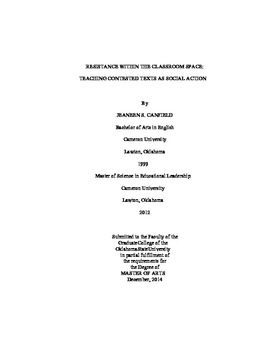| dc.contributor.advisor | Lewis, Lynn C. | |
| dc.contributor.author | Canfield, Jeaneen Sussanne | |
| dc.date.accessioned | 2016-01-20T15:44:28Z | |
| dc.date.available | 2016-01-20T15:44:28Z | |
| dc.date.issued | 2014-12-01 | |
| dc.identifier.uri | https://hdl.handle.net/11244/25639 | |
| dc.description.abstract | Drawing from classical rhetoric and from scholars such as Paulo Freire, James Berlin, Henry Giroux, Ira Shor, bell hooks, Kristi Fleckenstein, and others, I seek to interrogate pedagogical implications of incorporating "hot-topic" texts within First Year Composition (FYC) classrooms. Chapter 1 explores the scholarly conversations about critical pedagogy and provides the theoretical framework for the study. I discuss the relationship between social-epistemic rhetoric and critical pedagogy, and examine the ways students might be encouraged to participate in productive citizenship. In chapter 2, I report and explain a teacher research project I constructed to study possible forms of resistance FYC instructors exhibit when they encounter hot-topic texts in their classroom spaces. I began my research project with a personal reflection journal where I recorded my reactions toward classroom discussions that included socially-contested issues. I became curious to know if other FYC instructors reacted similarly, so I conducted the formal study which consisted of an online survey for FYC instructors to participate. Finally, in chapter 3, I discuss specific implications of a critical pedagogy that privileges ethics in the composition classroom. Calling on Berlin's article, I connect pedagogical practices with their underlying ideologies. Second, I trace the relationship between ethics and rhetoric in the composition classroom, pursuing a method that extends this relationship to incorporate how teachers choose course readings and why choosing hot-topic texts can be productive for critical pedagogy. Finally, after exploring how language is a skill that involves purposeful instruction, I offer a heuristic that allows for a composition instructor to utilize hot-topic texts as one avenue through which she can encourage critical writing for all students within their differing value systems. I argue that through the practice of critical pedagogy, there is an ethical responsibility to incorporate hot-topic issues in first-year composition classrooms in order to foster opportunities for dialectic and critical writing: which leads to productive citizenship. | |
| dc.format | application/pdf | |
| dc.language | en_US | |
| dc.publisher | Oklahoma State University | |
| dc.rights | Copyright is held by the author who has granted the Oklahoma State University Library the non-exclusive right to share this material in its institutional repository. Contact Digital Library Services at lib-dls@okstate.edu or 405-744-9161 for the permission policy on the use, reproduction or distribution of this material. | |
| dc.title | Resistance Within the Classroom Space: Teaching Contested Texts as Social Action | |
| dc.type | text | |
| dc.contributor.committeeMember | Brooks, Ronald | |
| dc.contributor.committeeMember | Damron, Rebecca | |
| osu.filename | Canfield_okstate_0664M_13751.pdf | |
| osu.accesstype | Open Access | |
| dc.description.department | English | |
| dc.type.genre | Thesis | |
